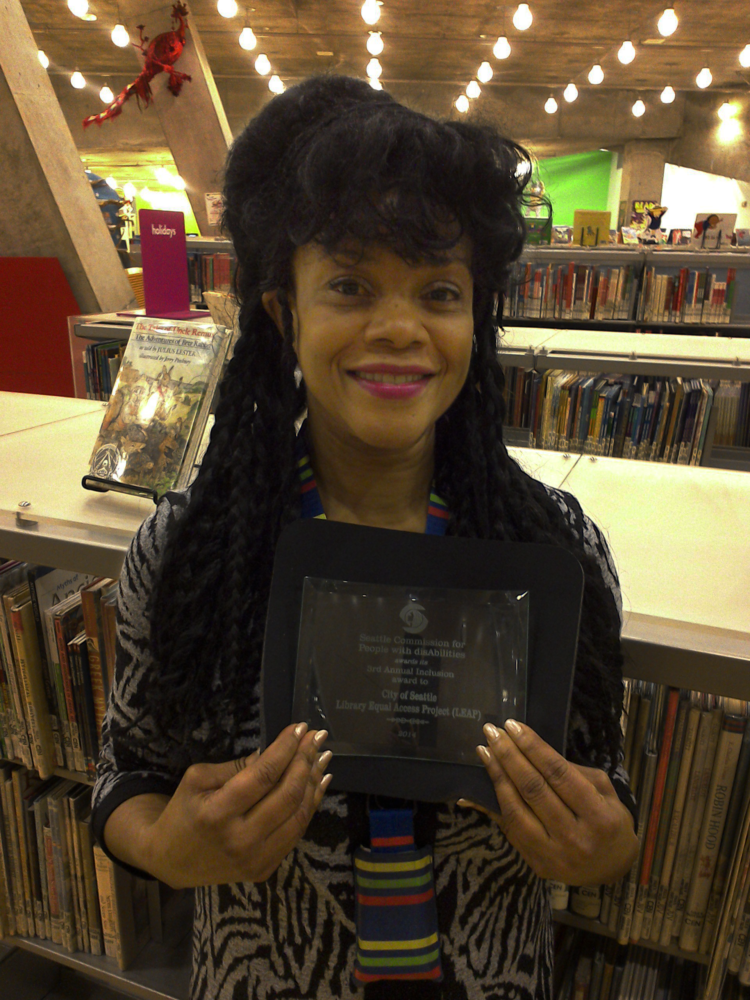
Cleo Brooks is such a fixture at the Library that even Camille Jassny’s guide dog knows where to find her office at Central Library.
Brooks has headed LEAP—the Library Equal Access Program—for 30 years. Next year, she will retire from her decades of service as the Library’s ambassador for patrons with disabilities.
“She’s just so caring and so warm,” says Jassny, who founded the Low-Vision Book Group with Brooks in 2006. “I’ve never met anybody quite like her.”
Brooks maintains a lifelong connection to The Seattle Public Library. Having grown up in Bellevue, her mother, then a science teacher, would take her and her siblings to story time at the Central Library and check out books and 8mm films.
Since starting her job at the Library in 1990—the year the Americans With Disabilities Act was passed by Congress—she has overseen LEAP nearly from its inception to what it has become today—a hub of resources and technology that help people of all abilities access Library materials or even just use the computer.
That technology has changed quite a bit in 30 years. She recalls a man older than 60 with visual impairments who came to the Library with his 85-year-old mother so she could read him the materials. When the Library offered its first reading machine in 1991, the man could enter the Library and use it himself.
“Now I feel like an adult, like I’m part of the world,” Brooks recalls him saying.
But perhaps what’s changed more, Brooks says, is the culture of acceptance and advocacy for people with disabilities, and their increased sense of independence. She’s had patrons use the assistive technology at the LEAP Lab to find professional work and pursue higher education thanks to Library resources.
“I receive so much support in my life to feel independent and capable and I just wanted to provide that as a library service,” she says.
She’s known to work tirelessly to support her patrons, using her fluency in American Sign Language to talk to patrons with hearing loss and providing access for people using wheelchairs.
“She’s willing to go as far as she can to meet the many needs that our patrons have,” says C.J. Glenn, a library associate who supports Brooks in her capacity as LEAP supervisor and ADA coordinator. “Seeing how deftly Cleo met those patrons’ needs was inspiring to me and taught me a lot about my own role to help people.”
Jassny says that even after the Low-Vision Book Group meets, Brooks helps each member find the transit they need or has walked them across the street in a human chain to the soup café for a post-meeting lunch.
“She’s gone beyond the call of duty,” Jassny says. “She has a heart of gold.”
Dan and Dave Ortner, two brothers who are now the facilitators of the Low-Vision Book Group, say they’ve missed Brooks during the Library closures and will miss her presence in the Library after her retirement.
“She’s just the sweetest, nicest person and she’s always available to help,” Dan Ortner says.
Her work has even inspired the Ortner brothers and Jassny to advocate for the Library on matters such as Levy renewal and City budget funding.
“She’s been a wonderful asset to the Library—and an advocate for LEAP programs,” Dan Ortner says.
Meanwhile, she remains busy adapting services to the SOVID era, accommodating people seeking to attend remote events. She also continues to develop Sensory Story Time, a Foundation-supported program that started before COVID closures to include children with autism.
Her secret for nurturing the kindness and perseverance she’s known for? She recalls a simple, universal adage her family instilled in her throughout her life.
“Just remember to be kind and remember to treat people the way you would like to be treated,” she says.
Learn more about LEAP and its services at spl.org/leap.
This story appears in the Fall 2020 edition of our newsletter, “The Next Chapter.” Find the full edition here.

